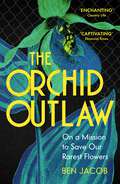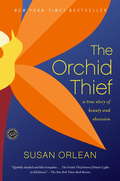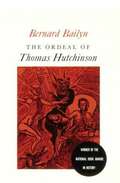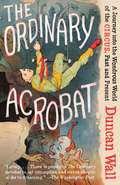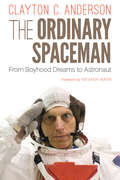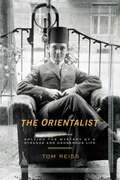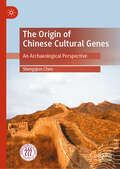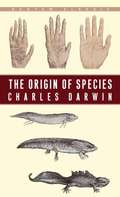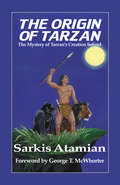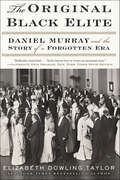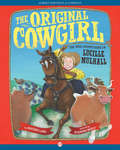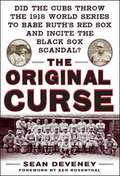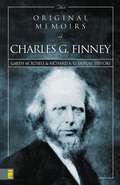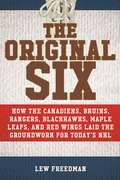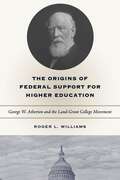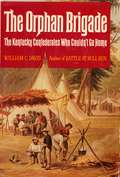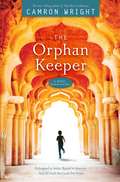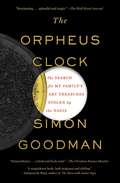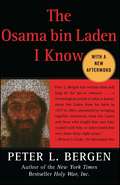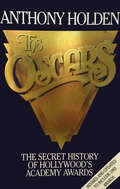- Table View
- List View
The Orchid Outlaw: On a Mission to Save Britain's Rarest Flowers
by Ben JacobTEN YEARS AGO, BEN JACOB TURNED OUTLAW TO SAVE OUR RAREST FLOWERS. THIS IS HIS STORY.Obsessed by orchids since childhood, Ben spent years travelling to far-flung jungles to see them in the wild. Then a chance encounter set him off on a journey of discovery into the wonderful, but often forgotten, world of Britain's fifty-one native species. These include the Bee which looks (and smells) so much like one that even bees are fooled, the Ghost which exists without sunlight, and Autumn Lady's Tresses which gave Darwin the proof he needed for his theory of evolution.But our orchids are in desperate trouble. Many species are facing extinction. Decimated by changes in land use and climate, inadequately protected by environmental and planning laws, their habitats are disappearing fast. Determined to act before it was too late, Ben broke into building sites in the dead of night to rescue threatened plants, and turned his kitchen into a laboratory, his fridge into storage for hundreds of baby orchids, and his back yard into a plantation. But doing all that put him on the wrong side of the law. . . At once a memoir, a natural history, and an inspiring call to action, reintroducing us to Britain's most endangered flowers, The Orchid Outlaw shows us how we can all save the world, one plant at a time.
The Orchid Thief: A True Story of Beauty and Obsession
by Susan OrleanIn Susan Orlean's mesmerizing true story of beauty and obsession is John Laroche, a renegade plant dealer and sharply handsome guy, in spite of the fact that he is missing his front teeth and has the posture of al dente spaghetti. In 1994, Laroche and three Seminole Indians were arrested with rare orchids they had stolen from a wild swamp in south Florida that is filled with some of the world's most extraordinary plants and trees. Laroche had planned to clone the orchids and then sell them for a small fortune to impassioned collectors. After he was caught in the act, Laroche set off one of the oddest legal controversies in recent memory, which brought together environmentalists, Native Amer-ican activists, and devoted orchid collectors. The result is a tale that is strange, compelling, and hilarious. New Yorker writer Susan Orlean followed Laroche through swamps and into the eccentric world of Florida's orchid collectors, a subculture of aristocrats, fanatics, and smugglers whose obsession with plants is all-consuming. Along the way, Orlean learned the history of orchid collecting, discovered an odd pattern of plant crimes in Florida, and spent time with Laroche's partners, a tribe of Seminole Indians who are still at war with the United States. There is something fascinating or funny or truly bizarre on every page of The Orchid Thief: the story of how the head of a famous Seminole chief came to be displayed in the front window of a local pharmacy; or how seven hundred iguanas were smuggled into Florida; or the case of the only known extraterrestrial plant crime. Ultimately, however, Susan Orlean's book is about passion itself, and the amazing lengths to which people will go to gratify it. That passion is captured with singular vision in The Orchid Thief, a once-in-a-lifetime story by one of our most original journalists.
The Ordeal of Thomas Hutchinson
by Bernard Bailyn“This book,” the author writes, “depicts the fortunes of a conservative in a time of radical upheaval and deals with problems of public disorder and ideological commitment.” It is at the same time a dramatic account of the origins of the American Revolution from the viewpoint, not of the winners who became the Founding Fathers, but of the losers, the Loyalists. By portraying the ordeal of the last civilian royal governor of Massachusetts, the author explains “what the human reality was against which the victors struggled” and in doing so makes the story of the Revolution fuller and more comprehensible.
The Ordinary Acrobat: A Journey into the Wondrous World of the Circus, Past and Present
by Duncan WallThe extraordinary story of a young man's plunge into the unique and wonderful world of the circus--taking readers deep into circus history and its renaissance as a contemporary art form, and behind the (tented) walls of France's most prestigious circus school. When Duncan Wall visited his first nouveau cirque as a college student in Paris, everything about it--the monochromatic costumes, the acrobat singing Simon and Garfunkel, the juggler reciting Proust--was captivating. Soon he was waiting outside stage doors, eagerly chatting with the stars, and attending circuses two or three nights a week. So great was his enthusiasm that a year later he applied on a whim to the training program at the École Nationale des Arts du Cirque--and was, to his surprise, accepted. Sometimes scary and often funny, The Ordinary Acrobat follows the (occasionally literal) collision of one American novice and a host of gifted international students in a rigorous regimen of tumbling, trapeze, juggling, and clowning. Along the way, Wall introduces readers to all the ambition, beauty, and thrills of the circus's long history: from hardscrabble beginnings to Gilded Age treasures, and from twentieth-century artistic and economic struggles to its brilliant reemergence in the form of contemporary circus (most prominently through Cirque du Soleil). Readers meet figures past--the father of the circus, Philip Astley; the larger-than-life P. T. Barnum--and present, as Wall seeks lessons from innovative masters including juggler Jérôme Thomas and clown André Riot-Sarcey. As Wall learns, not everyone is destined to run away with the circus--but the institution fascinates just the same. Brimming with surprises, outsized personalities, and plenty of charm, The Ordinary Acrobat delivers all the excitement and pleasure of the circus ring itself.
The Ordinary Spaceman: From Boyhood Dreams to Astronaut
by Nevada Barr Clayton C. AndersonWhat’s it like to travel at more than 850 MPH, riding in a supersonic T-38 twin turbojet engine airplane? What happens when the space station toilet breaks? How do astronauts “take out the trash” on a spacewalk, tightly encapsulated in a space suit with just a few layers of fabric and Kevlar between them and the unforgiving vacuum of outer space?The Ordinary Spaceman puts you in the flight suit of U.S. astronaut Clayton C. Anderson and takes you on the journey of this small-town boy from Nebraska who spent 167 days living and working on the International Space Station, including more than forty hours of space walks. Having applied to NASA fifteen times over fifteen years to become an astronaut before his ultimate selection, Anderson offers a unique perspective on his life as a veteran space flier, one characterized by humility and perseverance. From the application process to launch aboard the space shuttle Atlantis, from serving as a family escort for the ill-fated Columbia crew in 2003 to his own daily struggles—family separation, competitive battles to win coveted flight assignments, the stress of a highly visible job, and the ever-present risk of having to make the ultimate sacrifice—Anderson shares the full range of his experiences. With a mix of levity and gravitas, Anderson gives an authentic view of the highs and the lows, the triumphs and the tragedies of life as a NASA astronaut.
The Oregon Trail
by Francis ParkmanThe author's journey brings the sight, sound and smell of the Great Plains of the mid-19th century, a dry, treeless land of wild grasses and sagebrush.
The Orientalist: In Search of a Man Caught Between East and West
by Tom ReissOn the border between West and East, a Jewish man with a passion for the Arab world. Tom Reiss first came across Nussimbaum when he went to the ex-USSR to research Russia's oil reserves, and discovered a novel instead. Written on the eve of the Second World War, Ali and Nino is a captivating love story set in the glamorous city of Baku, Azerbaijan's capital. The novel's depiction of a lost cosmopolitan society is enthralling, but equally intriguing is the identity of the man who wrote it.
The Orientalist: Solving the Mystery of a Strange and Dangerous Life
by Tom ReissPart history, part cultural biography, and part literary mystery, The Orientalist traces the life of Lev Nussimbaum, a Jew who transformed himself into a Muslim prince and became a best-selling author in Nazi Germany. Born in 1905 to a wealthy family in the oil-boom city of Baku, at the edge of the czarist empire, Lev escaped the Russian Revolution in a camel caravan. He found refuge in Germany, where, writing under the names Essad Bey and Kurban Said, his remarkable books about Islam, desert adventures, and global revolution, became celebrated across fascist Europe. His enduring masterpiece, Ali and Nino-a story of love across ethnic and religious boundaries, published on the eve of the Holocaust-is still in print today.But Lev's life grew wilder than his wildest stories. He married an international heiress who had no idea of his true identity-until she divorced him in a tabloid scandal. His closest friend in New York, George Sylvester Viereck-also a friend of both Freud's and Einstein's-was arrested as the leading Nazi agent in the United States. Lev was invited to be Mussolini's official biographer-until the Fascists discovered his "true" identity. Under house arrest in the Amalfi cliff town of Positano, Lev wrote his last book-discovered in a half a dozen notebooks never before read by anyone-helped by a mysterious half-German salon hostess, an Algerian weapons-smuggler, and the poet Ezra Pound. Tom Reiss spent five years tracking down secret police records, love letters, diaries, and the deathbed notebooks. Beginning with a yearlong investigation for The New Yorker, he pursued Lev's story across ten countries and found himself caught up in encounters as dramatic and surreal, and sometimes as heartbreaking, as his subject's life. Reiss's quest for the truth buffets him from one weird character to the next: from the last heir of the Ottoman throne to a rock opera-composing baroness in an Austrian castle, to an aging starlet in a Hollywood bungalow full of cats and turtles.As he tracks down the pieces of Lev Nussimbaum's deliberately obscured life, Reiss discovers a series of shadowy worlds-of European pan-Islamists, nihilist assassins, anti-Nazi book smugglers, Baku oil barons, Jewish Orientalists-that have also been forgotten. The result is a thoroughly unexpected picture of the twentieth century-of the origins of our ideas about race and religious self-definition, and of the roots of modern fanaticism and terrorism. Written with grace and infused with wonder, The Orientalist is an astonishing book. From the Hardcover edition.
The Origin of Chinese Cultural Genes: An Archaeological Perspective
by Shengqian ChenThis book first traces the evolution of Chinese culture, which has a triple structure. It traces back to the economic basis of the formation of Chinese culture and analyzes the pattern of the formation of Chinese civilization. The book goes deep into the level of cultural genes, explores the origin of Chinese culture, and discusses the construction of contemporary Chinese culture in combination with the general trend of historical process.
The Origin of Ping-Pong Diplomacy
by Mayumi ItohWhy and how did Japan Table Tennis Association President Goto Koji invite China to participate in the World Table Tennis Championships in Nagoya, Japan, in 1971 (the Nagoya World's)? Against strong opposition at home and abroad, Goto Koji created a stage for Premier Zhou Enlai to launch Ping-Pong Diplomacy, which changed world history forever
The Origin of Species
by Charles DarwinTo celebrate the 150th anniversary of the publication of Charles Darwin's seminal 1859 work introducing the theory of evolution by natural selection, science writer and journalist Quammen presents the first edition text richly augmented by more than 350 images including historical photos and portraits, Darwin's own drawings, images of the places he went, the people he saw, the creatures he encountered, and the ship he traveled on. An informative introduction and extensive reproductions from The Voyage of the Beagle (Darwin's research travel narrative) as well as brief excerpts from his biography, diaries, and correspondence provide added perspective on who the man really was, how he came to develop his revolutionary theory, and how one of the most important and controversial books in history came to be. Annotation ©2009 Book News, Inc., Portland, OR (booknews.com)
The Origin of Tarzan: The Mystery of Tarzan's Creation Solved
by Alison AtamianToday, Tarzan's universally popular appeal is as great as always. Scholars and fans are still intrigued with the problem of influence on ERB's imagination which created Tarzan. Research continues unabated and, in the opinion of Atamian, and with due respect, still misses the mark. The Origins of Tarzan solves the mystery of Tarzan's creation and reveals the major ideas which inspired Edgar Rice Burroughs to create one of the great hero archetypes of all times.
The Origin: A Biographical Novel of Charles Darwin
by Irving StoneNot only a story about the Darwin's cruise, which started him thinking about natural selection, but also an account of his wide-ranging career, his controversies, and his family.
The Original Black Elite: Daniel Murray and the Story of a Forgotten Era
by Elizabeth Dowling TaylorNew York Times–Bestselling Author: &“A compelling biography of Daniel Murray and the group the writer-scholar W.E.B. DuBois called &‘The Talented Tenth.&’&” —Patricia Bell-Scott, National Book Award nominee and author of The Firebrand and the First Lady In this outstanding cultural biography, the author of A Slave in the White House chronicles a critical yet overlooked chapter in American history: the inspiring rise and calculated fall of the black elite, from Emancipation through Reconstruction to the Jim Crow Era—embodied in the experiences of an influential figure of the time: academic, entrepreneur, political activist, and black history pioneer Daniel Murray. In the wake of the Civil War, Daniel Murray, born free and educated in Baltimore, was in the vanguard of Washington, D.C.&’s black upper class. Appointed Assistant Librarian at the Library of Congress—at a time when government appointments were the most prestigious positions available for blacks—Murray became wealthy as a construction contractor and married a college-educated socialite. The Murrays&’ social circles included some of the first African-American US senators and congressmen, and their children went to Harvard and Cornell. Though Murray and others of his time were primed to assimilate into the cultural fabric as Americans first and people of color second, their prospects were crushed by Jim Crow segregation and the capitulation to white supremacist groups by the government, which turned a blind eye to their unlawful—often murderous—acts. Elizabeth Dowling Taylor traces the rise, fall, and disillusionment of upper-class African Americans, revealing that they were a representation not of hypothetical achievement but what could be realized by African Americans through education and equal opportunities. &“Brilliantly researched . . . an emotional story of how race and class have long played a role in determining who succeeds and who fails.&” —The New York Times Book Review &“Brings insight to the rise and fall of America&’s first educated black people.&” —Time &“Deftly demonstrates how the struggle for racial equality has always been complicated by the thorny issue of class.&” —Patricia Bell-Scott, author of The Firebrand and the First Lady &“Reads like a sweeping epic.&” —Library Journal
The Original Cowgirl
by Heather Lang Suzanne BeakyWho says girls can't be cowboys? Lucille Mulhall wasn't like most girls in the 1890s. She didn't give a lick about sewing or cooking or becoming a lady. Lucille had her heart set on roping and riding. At a time when most women couldn't vote or own property, Lucille never let society's expectations or the dangers of roping and riding stop her from pursuing her passion. Traveling around the country, she broke records and thrilled crowds with her daring acts. Soon cowboys, ranch hands, and folks all over the world cheered for the feisty and fearless girl cowboy. This is a fixed-format ebook, which preserves the design and layout of the original print book.
The Original Curse: Did the Cubs Throw the 1918 World Series to Babe Ruth's Red Sox and Incite the Black Sox Scandal?
by Sean DeveneyIN THE GRAND TRADITION OF EIGHT MEN OUT ... the untold story of baseball's ORIGINAL SCANDAL. Did the Chicago Cubs throw the World Series in 1918--and get away with it? Who were the players involved--and why did they do it? Were gambling and corruption more widespread across the leagues than previously believed? Were the players and teams "cursed" by their actions? Finally, is it time to rewrite baseball history? With exclusive access to surprising new evidence, Sporting News reporter Sean Deveney details a scandal at the core of baseball's greatest folklore--in a golden era as exciting and controversial as our sports world today. This inside look at the pivotal year of 1918 proves that baseball has always been a game overrun with colorful characters, intense human drama, and explosive controversy.
The Original Has This Signature--W. K. Kellogg
by Horace B. PowellThe Story of a Pioneer in Industry and Philanthropy--W. K. Kellogg,who built a world-wide cereal industry and amassed one of the great fortunes of the twentieth century and reinvested his fortune in a philanthropic foundation designed to help people to help themselves.
The Original Memoirs of Charles G. Finney
by Garth M. Rosell Richard DupuisIn 1989, the first complete, restored text of revivalist Charles Finney’s memoirs was published by Zondervan. Until then, all editions had reflected editorial liberties introduced in the first 19th-century publication, edited after Finney’s death. The restored text—the culmination of over ten years of research by editors Garth Rosell and Richard Dupuis—brought to light Finney’s entire memoirs in their original language. Longstanding omissions and inaccuracies were corrected. Comprehensive annotations supplied detailed, phrase-by-phrase and even word-by-word explanations. The 1989 edition was a scholar’s and historian’s delight. However, the average reader who simply wants to read what Finney wrote doesn’t need the scholarly minutiae. This new edition provides the complete, restored text of Finney’s memoirs with no unnecessary details to obstruct a straightforward read. In bold, untouched language, Finney’s thoughts march across the page with fascinating clarity and cohesiveness. For students of revival or anyone interested in the life of one of America’s foremost evangelists, here in his own words is Charles Finney: his life, his thoughts, his struggles and accomplishments, and his abiding love for God and enduring commitment to the gospel of Christ.
The Original Six: How the Canadiens, Bruins, Rangers, Blackhawks, Maple Leafs, and Red Wings Laid the Groundwork for Today?s National Hockey League
by Lew FreedmanSince the inception of the National Hockey League on November 26, 1917, the sport of hockey has been one of the most popular games across the globe.After the National Hockey Association (NHA), which had been founded in 1909, ceased operations, the NHL took over and became a mainstay for the sport. While there had been teams that dated back to the 1800s and many that came and went through the years, there are six teams which are considered to be the Original or Traditional Six: the Montreal Canadiens, Boston Bruins, New York Rangers, Chicago Blackhawks, Toronto Maple Leafs, and Detroit Red Wings.In The Original Six, Lew Freedman (Clouds Over the Goalpost, A Summer to Remember) takes readers on a trip down memory lane, not only introducing the NHL’s humble beginnings, but how far the game has actually come.Broken up into six sections, Freedman tells the history and stories of the teams that represent the heart and soul of the NHL. From how these teams came to be and the steps that were taken to get them established to their early years and how they helped shape the game we love today, The Original Six is not only for lover’s of these teams, but for the sport itself.Whether you’re a diehard supporter or fair-weather fan, learn how this incredible sport began and of the teams that helped it grow into one of the most entertaining and enjoyable games in the world.Skyhorse Publishing, as well as our Sports Publishing imprint, are proud to publish a broad range of books for readers interested in sports-books about baseball, pro football, college football, pro and college basketball, hockey, or soccer, we have a book about your sport or your team.Whether you are a New York Yankees fan or hail from Red Sox nation; whether you are a die-hard Green Bay Packers or Dallas Cowboys fan; whether you root for the Kentucky Wildcats, Louisville Cardinals, UCLA Bruins, or Kansas Jayhawks; whether you route for the Boston Bruins, Toronto Maple Leafs, Montreal Canadiens, or Los Angeles Kings; we have a book for you. While not every title we publish becomes a New York Times bestseller or a national bestseller, we are committed to publishing books on subjects that are sometimes overlooked by other publishers and to authors whose work might not otherwise find a home.
The Origins of Federal Support for Higher Education: George W. Atherton and the Land-Grant College Movement
by Roger L. WilliamsThe Origins of Federal Support for Higher Education revises the traditional interpretation of the land-grant college movement, whose institutions were brought into being by the 1862 Morrill Act to provide for "the liberal and practical education of the industrial classes." Rather than being the inevitable consequence of the unfolding dynamic of institutional and socioeconomic forces, Williams argues, it was the active intervention and initiative of a handful of educational leaders that secured the colleges' future—above all, the activities of George W. Atherton.For nearly three decades, Atherton, who was the seventh president of the Pennsylvania State University, worked to secure consistent federal financial support for the colleges, which in their early years received little assistance from the states they were designed to benefit. He also helped to develop the institutions as comprehensive "national" universities grounded in the liberal arts and sciences—a conception that countered the prevailing view of the colleges as mainly agricultural schools.Atherton became the prime mover in the campaign to enact the 1887 Hatch Act, which encouraged the establishment of agricultural experiment stations at land-grant colleges. The act marked the federal government's first effort to provide continuous funding to research units associated with higher education institutions. At the same times, Atherton played a key role in the formation of the first association of such institutions: The Association of American Agricultural Colleges and Experiment Stations. It was the Association that provided the critical mass needed to lobby Congress successively and to approach the many opportunities and threats the land-grant colleges faced during the 1885–1906 period.Atherton was also deeply involved in the campaign for the Morrill Act of 1890, which provided long-sought annual appropriations to land-grant colleges for a broad range of academic programs and encouraged steady growth in state support during the 1890s.Roger Williams traces the motives and tactics behind a series of laws that made the federal government irreversibly committed to funding higher education and scientific research and provides rich new insights into the complexities, polarities, and inherent contradictions of the history of the American land-grant movement.
The Orphan Brigade: The Kentucky Confederates Who Couldn't Go Home
by William C. DavisOn September 18, 1861, ominous sounds of battle thundering in the distance, the Kentucky legislature voted to align itself with the Union. It was a decision which tore at the heart of the state, splitting apart families and severing friendships. For the newly formed First Kentucky Brigade, it marked a four-year separation from the beloved homeland. Fiercely independent to the end, these men would fight for the cause of the South. With their first march into battle, they became outcasts from their mother state -- orphans in the raging strife of civil war. William C. Davis has written a gripping story of the rebel troops whose remarkable spirit and tenacity were heralded throughout the Confederacy. The First Kentucky Brigade was "baptized in fire and blood" at the Battle of Shiloh and went on to serve with great distinction at Vicksburg, Baton Rouge, Chickamauga, and the fight for Atlanta. In this vivid narrative, the author captures the searing drama of each battle, as well as the unbearable drudgery of the months between. We see men of all backgrounds and ranks coming to grips with the war: some of them, renowned leaders such as John C. Breckinridge; others, young soldiers learning the horror of death for the first time. Drawing from a wealth of documents, memoirs, personal letters, and journals, Davis brings to life the fascinating history of the Civil War's "Orphan Brigade."
The Orphan Keeper
by Camron Wright<p>Seven-year-old Chellamuthu's life--and his destiny--is forever changed when he is kidnapped from his village in Southern India and sold to the Lincoln Home for Homeless Children. His family is desperate to find him, and Chellamuthu anxiously tells the Indian orphanage that he is not an orphan, he has a mother who loves him. But he is told not to worry, he will soon be adopted by a loving family in America. <p>Chellamuthu is suddenly surrounded by a foreign land and a foreign language. He can't tell people that he already has a family and becomes consumed by a single, impossible question: How do I get home? But after more than a decade, home becomes a much more complicated idea as the Indian boy eventually sheds his past and receives a new name: Taj Khyber Rowland. <p>It isn't until Taj meets an Indian family who helps him rediscover his roots, as well as marrying Priya, his wife, who helps him unveil the secrets of his past, that he begins to discover the truth he has all but forgotten. Taj is determined to return to India and begin the quest to find his birth family. But is it too late? Is it possible that his birth mother is still looking for him? And which family does he belong to now? <p>From the best-selling author of The Rent Collector, this is a deeply moving and gripping journey about discovering one's self and the unbreakable family bonds that connect us forever.</p>
The Orpheus Clock
by Simon GoodmanThe passionate, gripping, true story of one man's single-minded quest to reclaim what the Nazis stole from his family, their beloved art collection, and to restore their legacy.Simon Goodman's grandparents came from German-Jewish banking dynasties and perished in concentration camps. And that's almost all he knew about them--his father rarely spoke of their family history or heritage. But when he passed away, and Simon received his father's old papers, a story began to emerge. The Gutmanns, as they were known then, rose from a small Bohemian hamlet to become one of Germany's most powerful banking families. They also amassed a magnificent, world-class art collection that included works by Degas, Renoir, Botticelli, Guardi, and many, many others. But the Nazi regime snatched from them everything they had worked to build: their remarkable art, their immense wealth, their prominent social standing, and their very lives. Simon grew up in London with little knowledge of his father's efforts to recover their family's prized possessions. It was only after his father's death that Simon began to piece together the clues about the Gutmanns' stolen legacy and the Nazi looting machine. He learned much of the collection had gone to Hitler and Hermann Goering; other works had been smuggled through Switzerland, sold and resold to collectors and dealers, with many works now in famous museums. More still had been recovered by Allied forces only to be stolen again by heartless bureaucrats--European governments quietly absorbed thousands of works of art into their own collections. Through painstaking detective work across two continents, Simon has been able to prove that many works belonged to his family, and successfully secure their return. With the help of his family, Simon initiated the first Nazi looting case to be settled in the United States. They also brought about the first major restitution in The Netherlands since the post-war era. Goodman's dramatic story, told with great heart, reveals a rich family history almost obliterated by the Nazis. It is not only the account of a twenty-year long detective hunt for family treasure, but an unforgettable tale of redemption and restoration.
The Osama bin Laden I Know
by Peter BergenThe Osama bin Laden I Know is an unprecedented oral history of Osama bin Laden's rise to revered leader of al Qaeda. Peter Bergen takes the reader onto the battlefields of Afghanistan as bin Laden goes from a shy, quiet teen to a leader; he brings you into Osama's intimate family life as he lives under the radar in Sudan, then Afghanistan; he puts you right in the room for al Qaeda's very first meeting; and he uses eyewitness accounts to relate what bin Laden said, and thought on 9/11 as he watched the twin towers fall. Derived from Bergen's interviews with more than 50 people who know bin Laden personally, from his highschool teacher to an early al Qaeda member who later became a US informant, The Osama bin Laden I Know recounts individual experiences with the man who has declared the US, and its allies, his greatest enemies.
The Oscars
by Anthony HoldenIt is just thirteen inches tall and weighs eight pounds, yet the Oscar has come to exert an hypnotic hold over film performers and audiences alike. This book uses the narrative story of an individual year as the basis of a much broader and historical canvas, to present a portrait of the film world today, and its personalities, finances and power-struggles. It also includes detailed lists of Oscar facts and figures, winners and losers. The author's other books include best-selling biographies of Prince Charles and Laurence Olivier.
